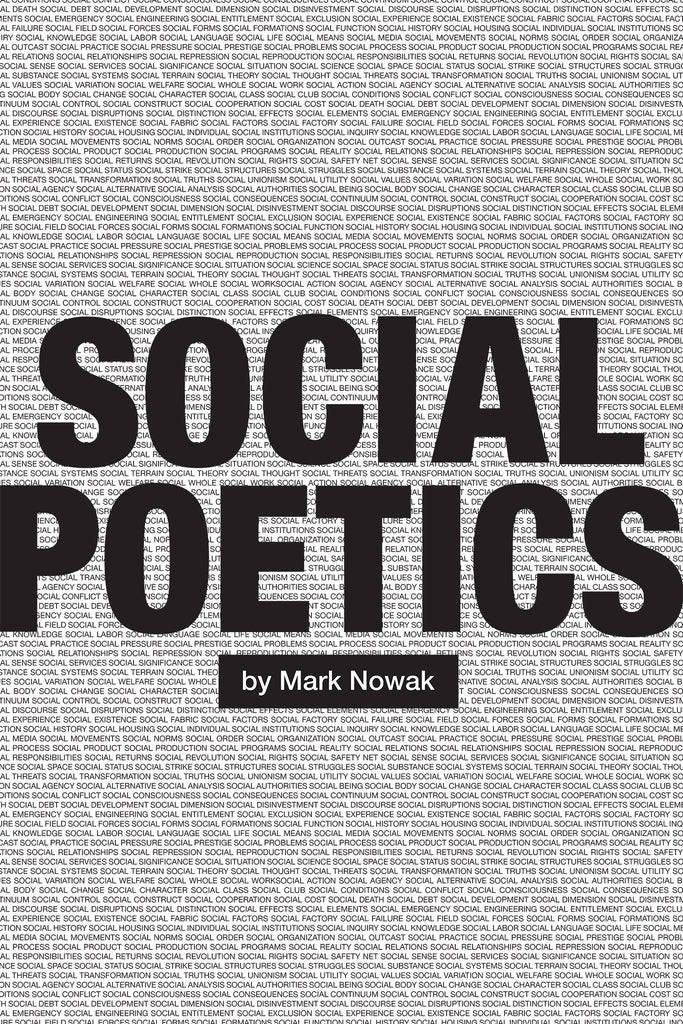$18.95
Social Poetics
Essay by Mark Nowak
March 10, 2020 • 6 x 9 • 288 pages • 978-1-56689-567-5
A people’s history of the poetry workshop from a poet and labor activist heralded by Adrienne Rich for “regenerating the rich tradition of working-class literature.”
Social Poetics documents the imaginative militancy and emergent solidarities of a new, insurgent working class poetry community rising up across the globe. Part autobiography, part literary criticism, part Marxist theory, Social Poetics presents a people’s history of the poetry workshop from the founding director of the Worker Writers School. Nowak illustrates not just what poetry means, but what it does to and for people outside traditional literary spaces, from taxi drivers to street vendors, and other workers of the world.
About the Author
Mark Nowak is the author of Coal Mountain Elementary, Shut Up Shut Down, and Revenants. He is the recipient of the Freedom Plow Award for Poetry & Activism and fellowships from the Lannan and Guggenheim foundations. Nowak has led poetry workshops for workers and trade unions in the US, South Africa, the UK, Panama, the Netherlands, and elsewhere. He is currently a professor of English at Manhattanville College and the founding director of the Worker Writers School.
Praise for Social Poetics
Entropy Magazine, “March 2020 Most Anticipated Small Press Releases”
“Inspiring. . . . Social Poetics follows most closely in the tradition of radical collections such as Adrienne Rich’s What Is Found There, June Jordan’s Poetry for the People, and bell hooks’s Teaching to Transgress, which explore the connections between politics and poetry and describe pedagogical methods for emancipatory learning. . . . [A]n urgent, much-needed social vision for poetry today.” —Margaret Ronda, Los Angeles Review of Books
“Social Poetics shines a light on a fraught and inspiring history of radical participatory cultural experiments that may be of use to socialist culture in the present. . . . Nowak’s [Worker Writers School], and the participatory left cultural history it sees itself through, offers visionary steps for a way forward.” —William Harris, Jacobin
“If a creative writing text ever raised a call to the barricades, it’s this one. . . . The work deserves a place on the shelf of any thinking teacher in the field. Anyone can use a breath of fresh air, a bracing reminder of art’s power to change the world.” John Domini, Brooklyn Rail
“[A] compelling exploration of radical working-class poetry. . . . Nowak, like those early-20th century activists who organized with the Industrial Workers of the World, is a true radical culture worker who aims to create solidarity among low-wage workers and leverage that power for justice. . . . [Social Poetics] invites us down a path where solidarity through poetic community can lead to radical social transformation.” —Phillip Metres, Jewish Currents
“Nowak’s work follows in the tradition of Langston Hughes. . . . Social Poetics records an enduring tradition of people chronicling their conditions and discovering their own language as a resource for sharing their experiences and organizing. Nowak’s focus on workshops, from Attica to the Worker Justice Center of New York, powerfully re-envisions what literary communities might look like, and how they can expand the range of poetic expression, enliven social movements and foster solidarity across oceans.” —Harris Feinsod, In These Times
“[B]oth an attempt to recuperate a forgotten literary canon (literature made for and inside working-class struggle) and an effort to summon forth new structures of organization, expression, and literary culture. . . . These incredible displays of vision, heart, and solidarity demonstrate that poetry, so often associated with the snooty, the stuffy, and the sequestered, can absolutely resonate with working-class people—so long as issues of concern to working-class people hold relevance to the world of poetry.” —Alex Gallo-Brown, Poetry Northwest
“Social Poetics is, in a way, Nowak’s call to arms, his manifesto—the guiding principles behind decades of work and a roadmap for the work of the future. . . . Social Poetics provides us a way to organize, to build, not merely as poets, but as global citizens. . . . ” —Amish Trivedi, Iowa Review
“Social Poetics focuses on the history of poetry workshops from the perspective of working-class people who attempted to spark social change despite being largely overlooked by society.” —Abby Foster, Chronogram
“[A]n exciting addition to poetry’s grail quest for a first-person plural, a collective enunciation. Nowak’s writing is attuned to the needs of today in what feels like a new horizon taking shape, part of a larger appreciation for the poetics of relationality and experience. . . . Provides powerful witness to the verb of poetry—poetry as a social act, whereby workers reclaim autonomy over their creations.” —Joe Rupprecht, Full Stop
“An extraordinary guidebook on the history, current state, and future of working-class poetics, [Social Poetics] asks: what happens when poetry becomes a central subject of the working class? How do social poetics push back on what is naturalized into non-existence under capitalism?” ATM Magazine
[A]n invaluable archive of an otherwise little-documented field.” —Poetry Foundation
“Whether unpacking Mikhail Bakhtin’s ‘unity of the emerging idea,’ demonstrating the practical application of alliteration, or recalling his daughter teaching youth prison poets origami, Mark Nowak testifies to the urgency and intimacy of poetry in our prisons, union halls, and workers’ centers. Social Poetics tracks what happens when people gather around poems: conjunctions, dialogues, imaginative militancy, solidarities. This supple, comprehensive book is a study in the poetics of bearing witness, bearing tools, and bearing possibilities.” —Terrance Hayes
“Social Poetics materializes imaginative militancy. With a litany of the social as pervasive and intimate, and political memories of life-and-death struggles for justice, Nowak crafts a transformative workshop for the collective. This is an important record of how the people’s power, poetry, and history maintain us and the beauty of our world(s).” —Joy James


